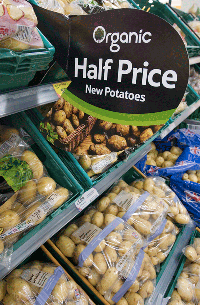Going organic would capture more carbon

More than 3m extra tonnes of atmospheric carbon would be absorbed if all UK farmland was converted to organic, the Soil Association has claimed.
This figure – equivalent to taking almost 1m cars off the road – was released following an 18-month study into carbon sequestration levels in organic and conventional farming systems.
According to the report, organic farming produced 28% more soil carbon than conventional systems and widespread adoption of organic farming practices could offset 23% of UK agricultural emissions through carbon sequestration alone.
Soil Association director Patrick Holden reckoned it was the most significant report the organisation had produced for several years.
“It is not just a report for organic, it has implications for the whole of UK agriculture,” he said. “Farming must reduce or offset carbon emissions and, to do this, there must be fundamental changes to management practices”.
But adapting conventional farming systems to sequester carbon wasn’t enough, he said. “No-till cultivation on its own won’t deliver the change – we need to move from fertiliser-based agriculture to farming systems based on traditional crop rotations.”
Using global food shortages as an excuse to exempt agriculture from emissions targets was not acceptable, he added. “Many advocates of conventional systems hope agriculture will be exempt from emissions targets on the grounds that a growing population must be fed.”
But despite its reduced output, he reckoned organic agriculture was capable of feeding the world.
“By shifting our diets we could feed the world sustainably – we need to move to healthier diets based on unprocessed seasonal produce and forage-fed meat.” Cereals should no longer be used to feed livestock and as a result we would have to reduce our consumption of white meat, he added.
NFU policy adviser Aarun Naik agreed that agriculture had an important role to play in managing soil carbon and reducing greenhouse gas emissions, but advocating the conversion of all UK farmland to organic farming oversimplified a complex issue, he said.
“The entire agriculture industry in the UK was part of the solution to climate change and enhanced carbon storage in vegetation and soils was only one of several approaches by which farmers could tackle their greenhouse gas emissions,” he added.
“Other measures include improving resource use efficiency, use of bio-energy technologies to displace reliance on fossil fuel use and greater adoption of renewable energy technologies.”

